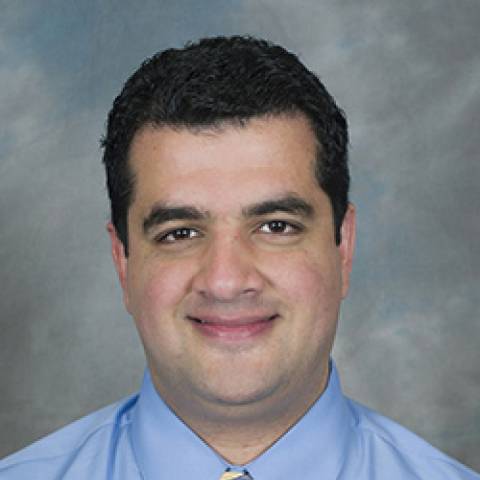
The future of immunotherapy
As the new medical director of the Bezos Family Immunotherapy Clinic at Fred Hutch Cancer Center, Mazyar Shadman, MD, MPH, calls immunotherapy a “game-changer for our patients.”
Shadman is a blood cancer expert whose research focuses on developing novel therapeutic agents such as targeted therapy and immunotherapy for lymphoid malignancies.
He runs clinical trials that harness these novel agents to treat blood cancers, especially chronic lymphocytic leukemia and lymphoma. That expertise has prepared him to oversee operations at the Immunotherapy Clinic, the clinical arm of the Immunotherapy Integrated Research Center.
Shadman also focuses on the long-term clinical outcomes of patients with blood cancer following treatment to identify patients who can benefit from specific treatments. He assumes the leadership of the Immunotherapy Clinic from David Maloney, MD, PhD, who retired after serving as the clinic’s first medical director starting in 2016 when the clinic opened.
Shadman is an associate professor in the Clinical Research Division at Fred Hutch and in UW Medicine’s Division of Hematology and Medical Oncology. He also holds the Innovators Network Endowed Chair, intended to spur leading-edge cancer research for an early-career scientist whose work reflects creativity and a novel approach to research, collaborative use of data science and/or emerging technology and meaningful patient benefit.
The future of immunotherapy
In this Q&A, Shadman discusses his vision for the future of immunotherapy at Fred Hutch.
What is your assessment of the current state of immunotherapy?
Cellular immunotherapy treatments, especially CAR T cells, are effective and have improved the clinical outcomes significantly but there is still room for improvement. As their safety profile improves, we are able to bring them to more patients including to those in earlier lines of treatment. As a result, the number of patients we see referred to us for CAR T-cell therapy with lymphoma, myeloma, acute lymphoblastic leukemia and chronic lymphocytic leukemia is increasing.
For patients who are candidates for CAR T-cell therapy, we need to make sure they have universal access and timely access. One of the challenges we have in the field is to get CAR T cells to patients who need it and do it fast. We continue to work to make that possible for our patients, and we are expanding significantly in our capacity to do this.
When it comes to expanding access, there are patients in the community who we never hear about because the treating physician or patient may feel they don’t have the means. We believe that close engagement with our community [oncology] colleagues in order to provide support and education is critical to make sure all patients, including those with limited resources and underrepresented backgrounds, are presented with this option.
We need to reach out to our community partners to have a good understanding of barriers at the community level. As we are making sure underrepresented patients have the same access, we need to do research at the community level to understand the barriers and roadblocks in getting those patients in for treatment.
Can you talk about the types of patients who come to Fred Hutch for immunotherapy?
We get two types of patients: those treated at Fred Hutch who are referred to us and those who come from outside. With both of these groups, we need to get them in quickly to CAR T.
Patients who get CAR T need to stay at Fred Hutch for weeks. When I get a call from a community doctor about a patient, it can take weeks to get them in to start the treatment process. There are many reasons for this: the initial assessment required and our availability to do that, the process of getting a patient approved by insurance, the logistics of moving to Seattle for a few months with a caregiver, to name a few.
There is room for improvement at all these levels. We have started a new inpatient service with a main focus on patients undergoing immunotherapy treatments. We are also set to start a new outpatient team for cellular immunotherapy in a few months.
What does the ideal immunotherapy experience at Fred Hutch look like?
Our clinic has a capacity limit but understanding the rapidly growing immunotherapy landscape, our leadership strongly supports our expansion plans. Our goal is to minimize wait time and to have timely and universal access to CAR T is our big goal.
There are diseases like large B-cell lymphoma, mantle cell lymphoma, multiple myeloma, chronic myelocytic leukemia and acute lymphoblastic leukemia where immunotherapy is the standard of care. Treatment with tumor infiltrating lymphocytes (TILs), another form of cellular immunotherapy, has recently been approved for treatment of metastatic malignant melanoma.
When there is an approved product, we can utilize that, or we may have a study for these patients using novel cell therapy options or combinations. Our goal is to replicate our success in blood cancers for solid tumors. We have a long list of studies looking at immunotherapy for solid tumors and hematologic cancers and the list is getting longer.
Bringing the most promising clinical trials to our patients here is another goal. We want to use the science generated at Fred Hutch to make new CAR Ts, and we want to roll out studies combining existing CAR Ts with new drugs. What if we add a new medication to an existing CAR T? Does that make it more effective? We want to help move the field forward by studying new combinations. We have a number of trials investigating those questions, and we have more in the pipeline.